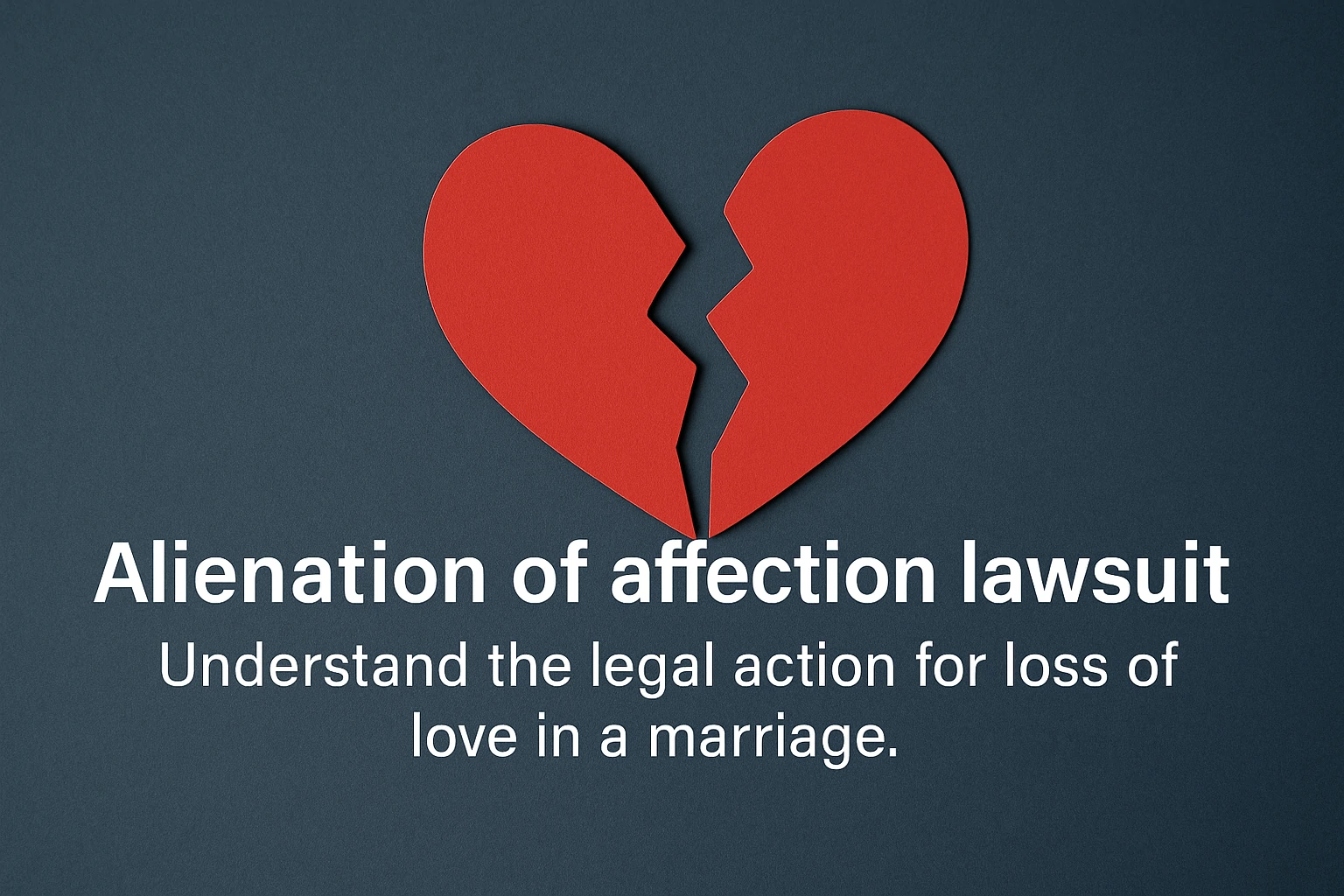Marriage is more than a piece of paper. It holds trust, love, and daily care. But that trust can break when someone outside the marriage steps in. When this happens, a few U.S. states allow the harmed spouse to sue that third person. This legal path is called an alienation of affection lawsuit.
Most people believe that an affair only leads to divorce. That is not always true. In some states, the law gives a person the right to take the matter to civil court. This lawsuit is not about anger. It is about harm. When someone ruins a marriage, the law can sometimes hold them accountable.
This type of case is rare. Only a few states allow it. But those who face it often feel lost or confused. The emotions are strong. The legal steps are complex. Still, the goal stays clear. The harmed spouse wants to show that someone outside the marriage took away love, trust, and support.
This article explains how alienation of affection lawsuits work. It covers what they mean, where they apply, how to prove them, and what the court may decide.
What Is an Alienation of Affection Lawsuit?
An alienation of affection lawsuit is a civil claim. It does not go through divorce court. It does not deal with who gets what. It deals with the loss of love in a marriage and who caused it. One spouse claims that a third party caused that loss.
The person being sued is often a romantic partner. But they do not have to be. A friend, coworker, or even a family member can be named if their actions broke the bond of marriage. The harmed spouse must show that the marriage had love and that the third party caused that love to fade.
The law does not ask for proof of sex or cheating. What matters is the loss of affection. The spouse must prove that someone’s actions caused that shift. Words, messages, behavior, or changes in routine can all support the claim.
The court wants to see a clear link. It looks at the marriage before and after the third party came into the picture. It listens to both sides. It asks, “Did this person cause the love in the marriage to disappear?”
Where These Cases Can Be Filed
Only a few states still allow these lawsuits. Most have removed them. But as of now, the law still supports them in:
- North Carolina
- Mississippi
- South Dakota
- Utah
- New Mexico
- Hawaii (in rare cases)
Each of these states has its own rules. Some require strong proof. Others have more flexible standards. If you live in one of these states, speak to a local attorney. They can explain what the law says and how it applies to your situation.
Alienation of affection lawsuits are not common. But they are serious. They open up private lives in public court. They deal with emotion, trust, and legal risk. A good lawyer can guide you through it.
What You Must Prove
To win, the harmed spouse must prove three things. First, they must show the marriage had real love. Second, they must show that love was lost. Third, they must prove that a third person caused that loss.
The court does not expect a perfect marriage. But it wants to see that the couple had affection before things fell apart. Texts, calls, photos, social media, and witness stories can help build the case. Any proof of closeness before and change after can make a difference.
It is not enough to say, “They ruined my marriage.” You must show it. Judges want facts, not just feelings. A strong case has records, messages, and behavior that clearly show the third party caused harm.
What the Court Can Decide
If the court agrees, it may award money to the harmed spouse. This money is called damages. It can cover pain, stress, and loss of support. In some cases, the amount is small. In others, it can be large.
Each case is different. The outcome depends on the proof, the people involved, and how strong the case is. Some people settle before trial. That means both sides agree on a payout to end the case quietly.
Others go through court. These trials can take time. Some may feel similar in stress and legal process to what happens in a personal injury lawsuit. They may cause more stress. But they also give a chance to tell the full story and seek justice.
How People Defend Against These Claims
The person being sued can fight back. They may say the marriage was already broken. They may show that they did not cause the loss of love. They may claim they did not even know the spouse was married.
A strong defense can break the case. The court will ask, “Was the marriage already weak?” If so, the claim may not stand. The court also looks at intent. If the third party had no plan to harm the marriage, that may help their case.
Sometimes both sides show signs of blame. The court weighs it all. The facts, not the feelings, guide the outcome.
How Fast You Must Act
Each state sets a deadline. That deadline is called the statute of limitations. If you wait too long, the court will not hear your case. You must act within the time limit.
If you think someone harmed your marriage, gather your facts. Save texts, photos, and records. Write down what happened and when. Then speak with a lawyer in your state. They can tell you if you have a case.
Fast action helps. Memories fade. Phones get replaced. People move. The sooner you act, the more power your case may have.
Should You File This Kind of Lawsuit?
Filing this case is a big step. It takes time. It opens up personal matters. It can be costly. You must decide if it will help you heal or bring more pain.
Some people feel better after filing. They feel seen and heard. Others regret it. These cases are not easy. But they are real legal tools. They protect marriage in states where the law allows it.
If you lost your marriage due to someone else, talk to a lawyer. Learn your rights. Weigh the pros and cons. A lawyer will guide you, step by step.
Conclusion
Alienation of affection lawsuits are not common. But in the states that allow them, they give a spouse a chance to speak. They send a message. Marriage is not just emotional, it has legal value.
These cases ask hard questions. They bring up old wounds. But they can also give closure. If someone took love from your life, the law may give you a way to respond.
Think carefully. Act wisely. Know your rights. And if you choose to file, make sure you have the right support.
Common Questions
Q. Can I sue someone even if there was no affair?
You can file a claim without proof of sex. The law focuses on lost affection, not just cheating. If someone damaged your marriage, they can be held responsible.
Q. Do these lawsuits work in every state?
Only a few states allow them. North Carolina, Mississippi, South Dakota, Utah, New Mexico, and Hawaii are the main ones. Most states have ended this law.
Q. Can a family friend be sued?
If their actions caused the loss of love in the marriage, yes. The law does not only target romantic partners. Any third party can face a claim.
Q. How much money can someone win?
It depends on the facts. Some claims win small amounts. Others lead to large payouts. Strong proof and a solid case can raise the value.
This article is for general information only. It does not offer legal advice. Please speak to a licensed attorney about your specific situation.




